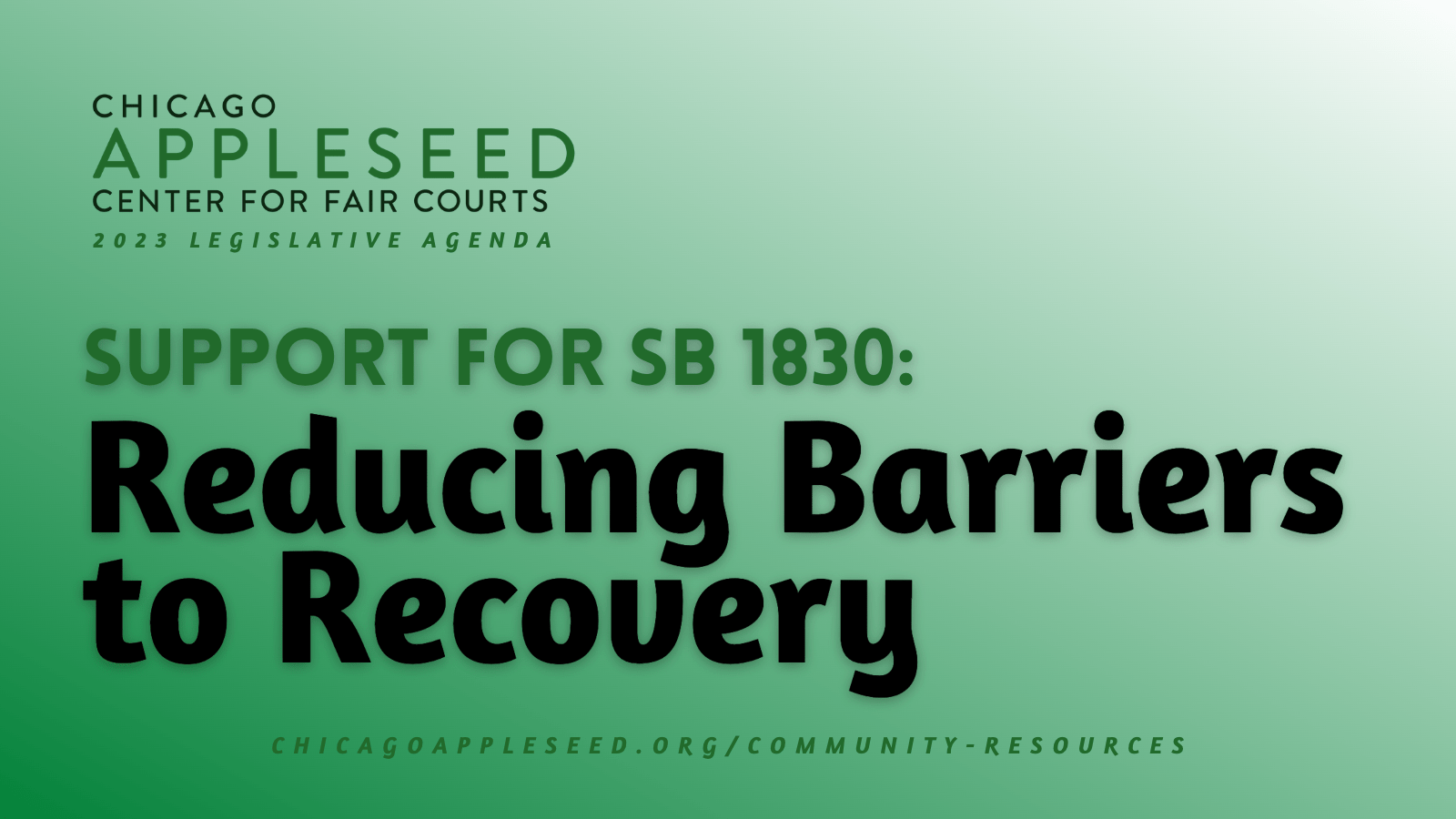Support for SB 1830: Reducing Barriers to Recovery
Updated: February 10, 2023
Illinois has made great strides in reforming its laws and attempting to end mass incarceration, the war on drugs, and other harms caused by the criminal legal system. In January, Illinois made itself a national criminal justice leader by being the first state to completely end the use of money bond. In drug policy, however, Illinois lags behind other states’ reforms. Many states have reduced penalties for drug possession, or even decriminalized it altogether, but Illinois has remained one of the only states where possession of any amount of a controlled drug is a felony offense. Despite the 5,000 person decrease in Illinois’ prison population over the past 20 years, the percentage of people incarcerated for simple drug possession has remained stagnant at 5%. Additionally, between the years of 2016 and 2018, 20,000 people in Illinois were convicted of felonies for possessing small amounts of drugs, and 7,500 of those people were imprisoned.
Illinois Senate Bill 1830 – “Reducing Barriers to Recovery,” sponsored by Senator Elgie Sims – would bring Illinois in line with the rest of the country on working toward decarceration and strengthening communities across the state. SB 1830 would help us move away from the failed strategies of punishment and incarceration, instead following the evidence about what works, and take a public health and harm reduction approach to drug use and substance use disorders.
Current law mandates that the possession of any amount of a controlled substance is classified as a felony. SB 1830 would establish new quantity thresholds; the reclassification would have a major impact on thousands of people every year. Simple drug possession would become more easily expunged from records, it would be easier for State’s Attorneys to divert people’s cases into alternatives to prosecution, and people charged with drug possession would spend less time in custody after arrest. Additionally, SB 1830 creates a framework for a voluntary misdemeanor diversion program, which would help provide access to treatment for people who need it; offers retroactive sentencing relief to tens-of-thousands of people harmed by felony convictions for low-level drug possession; enables people with misdemeanor drug convictions who have completed their sentence a pathway to records expungement after 5 years; and more.
Drug use is a public health issue in all communities, but data shows that Illinois residents of color make up a disproportionately high percentage of people sent to prison for simple low-level drug possession. The Northwestern Juvenile Project’s 2015 report, which researched youth substance use in Cook County, concluded that, “while white youth are more likely to have ‘hard drug’ use disorders, Black youth are more likely to be incarcerated for drug crimes.”
While Illinois neighborhoods of color are disproportionately harmed by incarceration for small-scale simple drug possession, the negative effects of prosecution and incarceration for drug use is widespread. A 2018 report from the Drug Policy Alliance found that the majority of women in federal prisons have been incarcerated for drug possession, and many are mothers of minor children who are also suffering from the current laws that cause mass family separation. Although the war on drugs has done its harshest damage to Black communities, rural, primarily white communities in Illinois have also seen a recent rise in prosecution and incarceration of certain drug charges. Ultimately, SB 1830 would have a wide beneficial reach, strengthening all communities across Illinois.
In an interview with The Daily Northwestern, Benjamin Ruddell from the American Civil Liberties Union of Illinois explained that there is no evidence to support that putting people in prison for drug possession leads to lower levels of drug use. In describing rehabilitation for substance use disorders, Ruddell states: “It’s a journey to recovery…It may take two years, it may take five years. A person does not benefit from being under criminal legal system control while they traverse that path.” That assertion is backed by research from the National Institutes of Health, which found in 2010 that 25% of people incarcerated for drug use return to prison within three years of their release. SB 1830 is working toward reducing barriers to recovery by treating drug possession as a health issue, not a legal issue. Incarcerating people who use drugs does not make them well.
It’s a journey to recovery…It may take two years, it may take five years. A person does not benefit from being under criminal legal system control while they traverse that path.
Benjamin Ruddell (ACLU-IL)
Further, people with felony convictions for drug possession often face severe and long-term harm beyond the completion of their sentence. These persistent challenges include finding employment, being denied access to public benefits and housing, facing social stigma, and other barriers to reintegration that may potentially prompt a return to substance use. SB 1830, through its reclassification of low-level drug possession and instatement of a voluntary diversion program, would enable people to remain in their communities while connecting them to whatever services necessary for their journey to recovery.
Chicago Appleseed Center for Fair Courts is proud to be a part of the diverse coalition of Illinois advocates and stakeholders supporting SB 1830, including people impacted by the criminalization of addiction, public health experts, criminal justice advocates, law enforcement officials, treatment providers, faith leaders, and business leaders. We encourage the Illinois legislature to pass SB 1830 and have Illinois join the growing list of states shifting away from punitive drug laws.
Contributor: Caleigh Bell-Rosof, Chicago Appleseed undergraduate intern and third-year student at Northwestern University with a major in American studies and a minor in legal studies, focusing on the intersection of gender and sexuality studies and legal studies.

